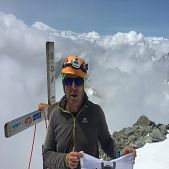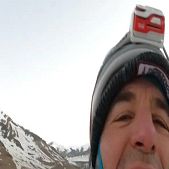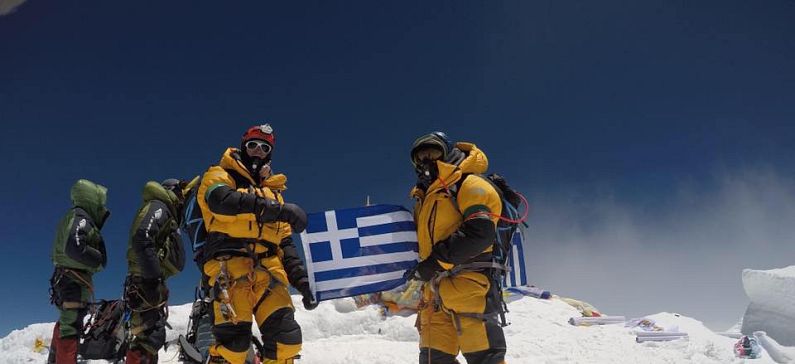
Ο πρώτος Έλληνας που κατέκτησε τρία βουνά του ορειβατικού «Γκραντ Σλαμ»
Antonis Sykaris became the first Greek to conquer three mountains of the mountaineering “Grand Slam” (14 tops of the world with a height of more than 8,000 meters), while in 2017 he climbed along with Mike Efmormidis to the top of the world, Everest of the Himalayas, and has recently captured the top of the Kangchenjunga Mountain, the world’s third tallest peak.
The climber was born on January 17, 1962, and has been involved in climbing for the last 29 years. He was the owner of the then-powerful family business in the trading of electrical appliances, Sykaris SA, an enterprise he inherited from his father. In 2004 he became aware of the arrival of multinational companies and the concentration that would come for the electrical appliances industry, and in 2005, when Antonis Sykaris led by his critical thinking and research from abroad, decided to close his business. “I left οn time – painlessly for my suppliers and creditors,” he said in an interview with news.gr. Later, he was involved in the exploitation of urban commercial real estate, the construction of a photovoltaic plant in Aspropyrgos and in mountaineering.
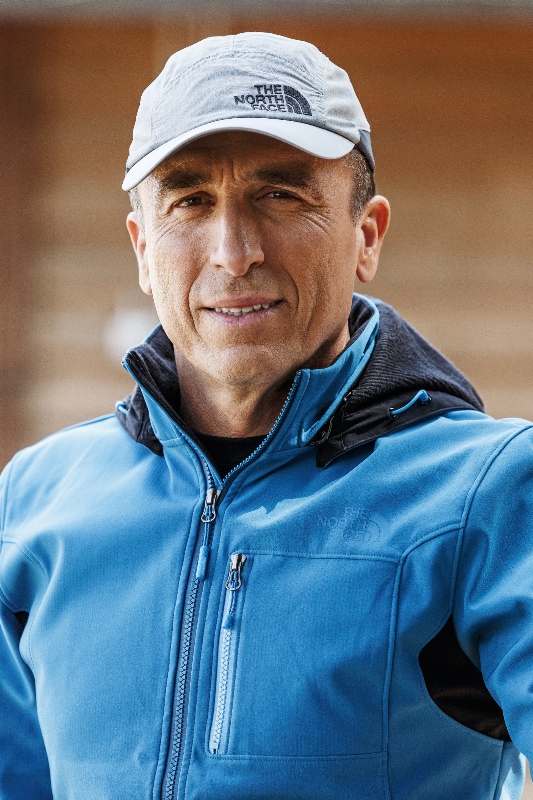
In 1989, while still working on the sale of electrical goods, he met someone who talked to him about the mountain and alpinism. Mr. Sykaris, already a nature-lover since a young child, decided to combine this love with what he heard about climbing. So, in 1990, he started hiking and mountaineering with clubs, until 2013, when he became a member of the Association of Young Mountaineers, where he was exclusively occupied with climbing. It was where he began his career in conquering peaks and the beginning of a journey without an end. “Well, I have found the meaning of life on those mountains,” he said in an interview, “It’s something I do with great enthusiasm and joy and with only the benefits for my soul and satisfaction.”
Since then, he has been a climber with an everlasting and recorded action in Greece and abroad, with great successes for Greek mountaineering either as a leader or as a member of a mission. In 2017, he conquered along with Mike Eformidis the highest point of recognition for a climber; Mount Everest – whose missions’ recorded deaths now exceed the 290, placing it in one of the most dangerous peaks. For this reason, the achievement of this summit is the reward of all efforts for every climber.
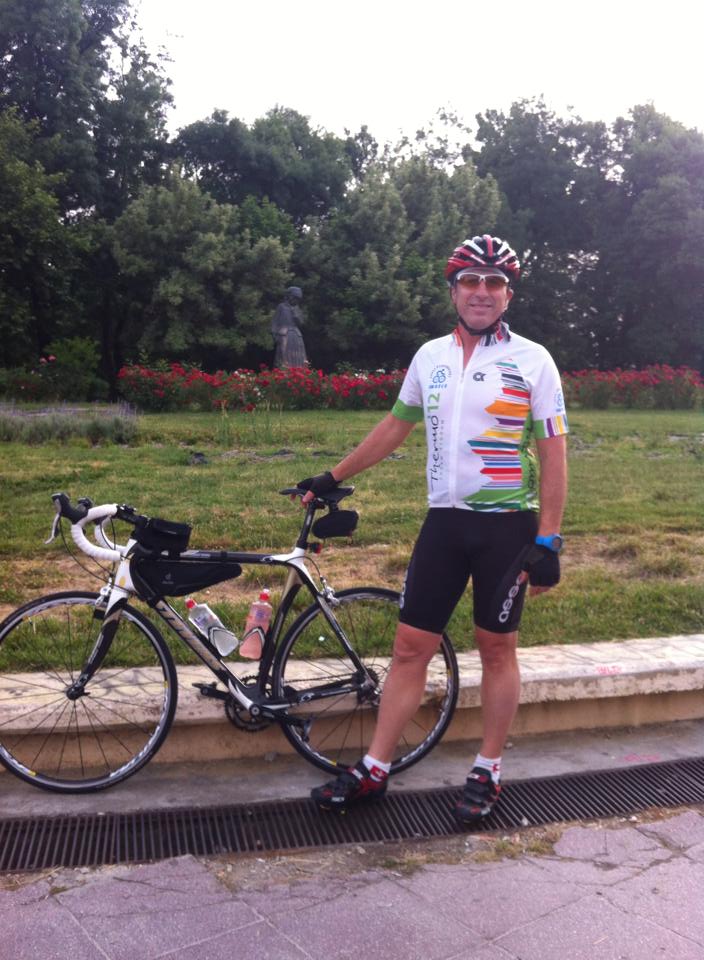
In 2018, he captured along with Fotis Theocharis the top of Mount Kangchenjunga, the third highest peak in the world, and Mount Manaslu along with Giorgos Marinos, aiming to conquer another mountain of the mountaineering “Grand Slam”. Moreover, he revealed that, in the spring of 2019, Mount Makalou (8.481 m) will be next and then, in the summer, K2 (8.611 m).
Read in detail what he told us in an interview:
Who is Antonis Sykaris?
“Antonis is a 56-year-old modern Greek who has not stopped dreaming – they say that is why you always dream at night; because they never sleep. I also see dreams and it is my greatest joy and happiness to make them come true. I re-charge through climbing, I have found the meaning of life on what is called “mountain” – unfailingly for twenty-one years now and with continuous action – not just in Greece, the Alps and the whole world. It is something I do with great joy and pleasure, without, of course, having any other benefit than that of my soul and my satisfaction. ”
How did you did you come to love mountaineering?
“In 1989, when someone came to the electrical shop I had and talked to me about the mountains. Because I loved nature as a kid, I loved being out in the countryside, sleeping under the stars, under the trees, I loved the outdoor life very much. And what he told me, I connected it to what I had inherently and, in the 90s, I started walking with some climbing clubs. By the age of 51, I joined the Association of Young Mountaineers, where we were occupied with climbing and much less with ascents in the mountains. After that, things took their course.”
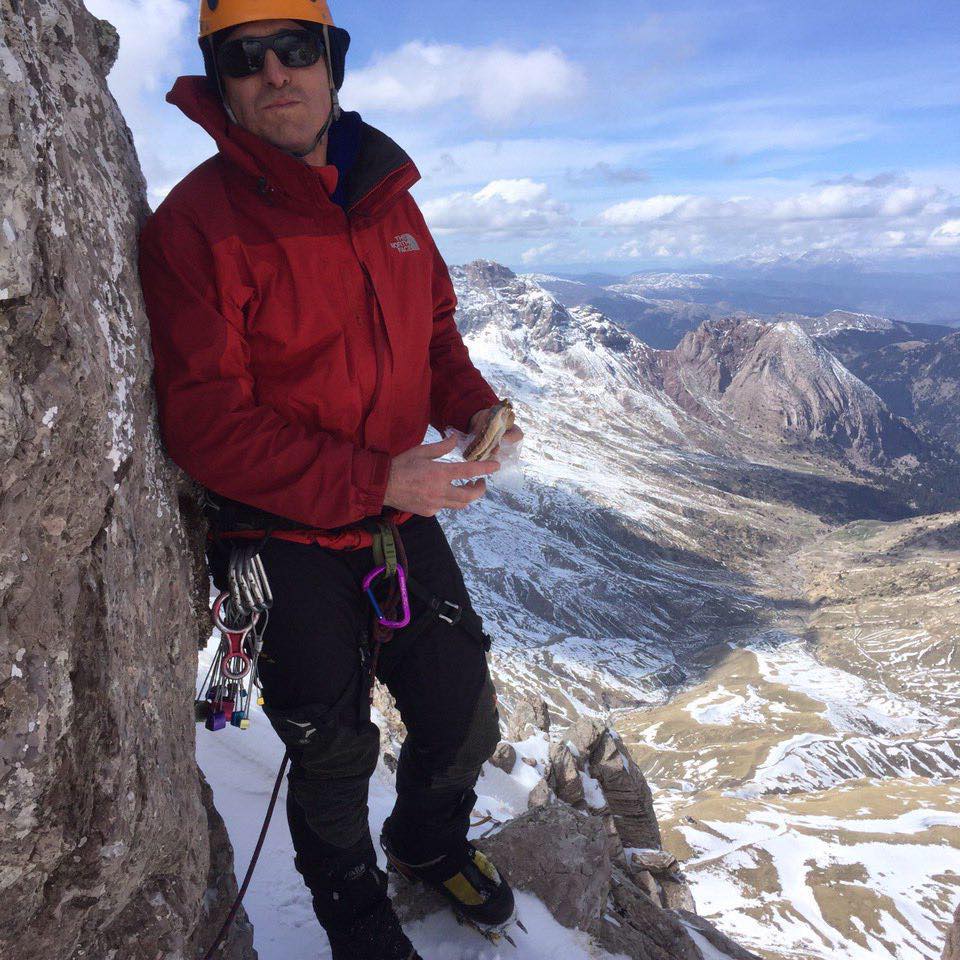
What is the feeling with each new ascent?
“I feel like I was getting the same satisfaction I had on every other ascent, except that previous joy and satisfaction are added up. Both the previous and the next are added and that is why each new ascent is even more satisfying. If I had to use only one word to describe the feeling, I would use “fullness”. It’s a joy finding yourself climbing on a northern hillside and need a little more to get to the top, see the curvature in front of you which leads you to the last dome of the top. There lies the greatest satisfaction – it’s a great joy and satisfaction,” he says and his voice trembles as if he remembers and relives those moments of complete pleasure and fullness, “But I have to say, the meaning doesn’t appear only when you conquer the mountain-top.
The feeling includes every other time that you’ve thought of reaching to your goal, you re-live the same thing as the time that you had come back in the past. It’s really impressive,” he admits and sounds fascinated by the fact even after so many years “but it’s a joy, a thrill, a pride, that you do not live only for the time you do it, but also every time you relive it. I have often said to myself that however the amount of money I was given, I wouldn’t want to redeem this satisfaction I have felt and feel every time I go out to this dome. It is something that when you recall, you are moved every single time.”
The path matters as well, right? Not just the top, right?
“Of course, of course. The memories of all those moments are amazing things,” he sighs with such a feeling of accomplishment even so far away from the mountain.
Which is the toughest peak you’ve climbed?
“Kangchenjunga, where no one had been up for three consecutive years. We were 42 people from 25 countries and only 17 went up – from which the two of us were Greeks. I consider this to be a great success and it is not only a national success, but it is also abroad. To those out there that we tell about Kangchenjunga, they say “Respect”, that it was truly a very important effort and a very important achievement. We are very proud to have done this, and this enables us to continue – because there are fourteen peaks. We have already been to three and, in 2019, we will keep on pursuing our goal. ”
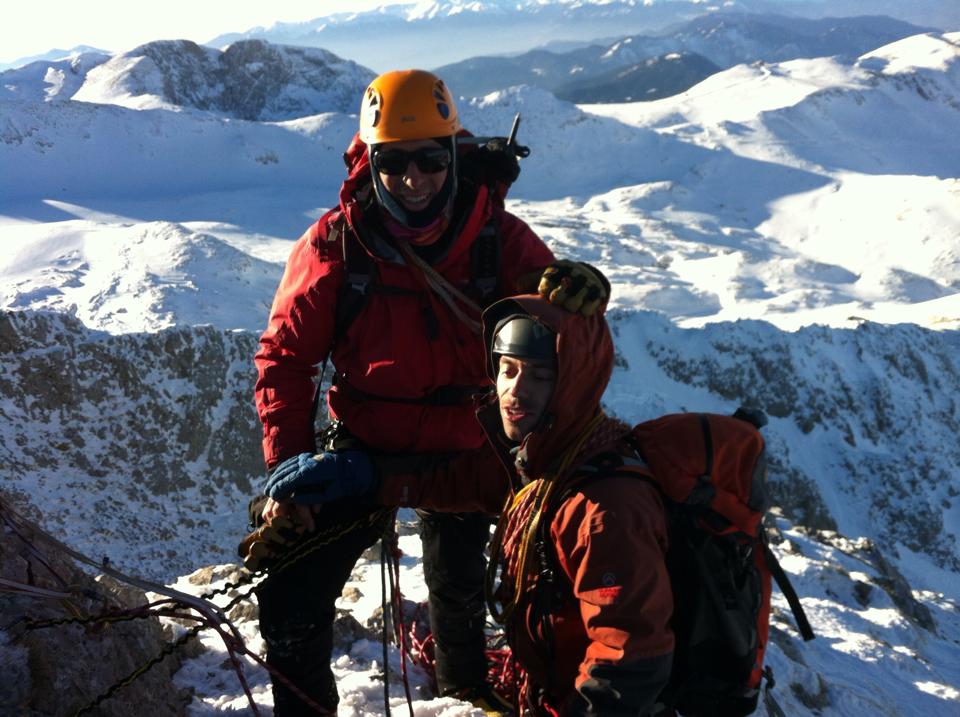
In the adverse weather conditions, what do you think to move on?
“Actually, you don’t do anything. Your own body and, above all, your mind – when you have a lot of experience from previous times – remember what to do to cope with the situation. The mind employs all this ability and adapts the body to overcome these difficulties. It is a matter of experience. It’s nothing other than saying “I’m here, I have a goal, and I’m not leaving unless I achieve it,” but to support that kind of thinking, an experienced soul and mind are needed.
The mind remembers and is activated by the old, previous memories of similar situations. It’s too many the times you’re thinking, “I’ll go back home, I can’t go on, I can’t stand this” and you suddenly face an internal; one part tells you to leave and the other to stay and get to the peak. In this struggle, only the experience and the will to achieve your goal can overcome the part that wants to give up. ”
What does your training require?
“An athlete-climber never stops training; their whole life is training. They need a daily workout, at least five to six times a week, aerobic exercises and mainly running. Υou have to do fifteen kilometers of running a day. It’s a way of life. Plus, you never stop climbing, which is the main component of mountaineering.
In alpinism, if you don’t climb, you do nothing. Now, in a few days, we’ll go to the Alps again. There, I have another project, the 82 peaks over 4,000 meters, a very serious undertaking that hasn’t been done by any Greek in the past and only a few people have done it in the world. It is very nice, the Alps have very nice climbing and it is also a fast trip. So, it’s another goal for training.
For extra training, I do Crossfit, where we do weights, high-bar, pulls and corresponding exercises. Also, bicycle, which offers significant aerobic exercise, and mountain climbs, which is simpler. ”

Has there been any moment when you were afraid for your life?
“Yes, this is always the case” he does not hesitate to honestly admit, “I think fear is the defense that we humans have to protect ourselves from death – without fear we would die much more easily. Just the more experienced you become, you cultivate your fear and it decreases. Up there, though, it needs carefulness because you’re on the verge – literally. But yes, you’re always afraid, you just do what goes by your hand and you protect yourself as much as you can.
You need luck, too, right? Mountaineering is a sport that, due to the technical difficulties you need to overcome, is only natural to inspire fear. But, the more experienced you are, the better you can protect yourself. I must, however, repeat that the factor of luck shouldn’t be forgotten – even if you make choices, they have to be lucky ones. ”
Is there any experience that has stigmatized you and always comes to your mind?
“Clearly, yes, because I have lost people on the mountains – on the 2nd of October was the anniversary of Babis Tsupras, twenty years after his death. I will also always remember the loss of Nikos Papandreou in Mount Dhaulagiri, in 1998, the mission we had at that time. These two losses are always in my mind, I will never forget them because they were two people I loved very much. And as I said, despite the twenty years that have passed, they are moments that will always remain engraved in my memory.
Because this is climbing; it can bring you the greatest joy, but on the lace of life, it can turn it on the other side and bring pain and death. Everything is in the game. ”
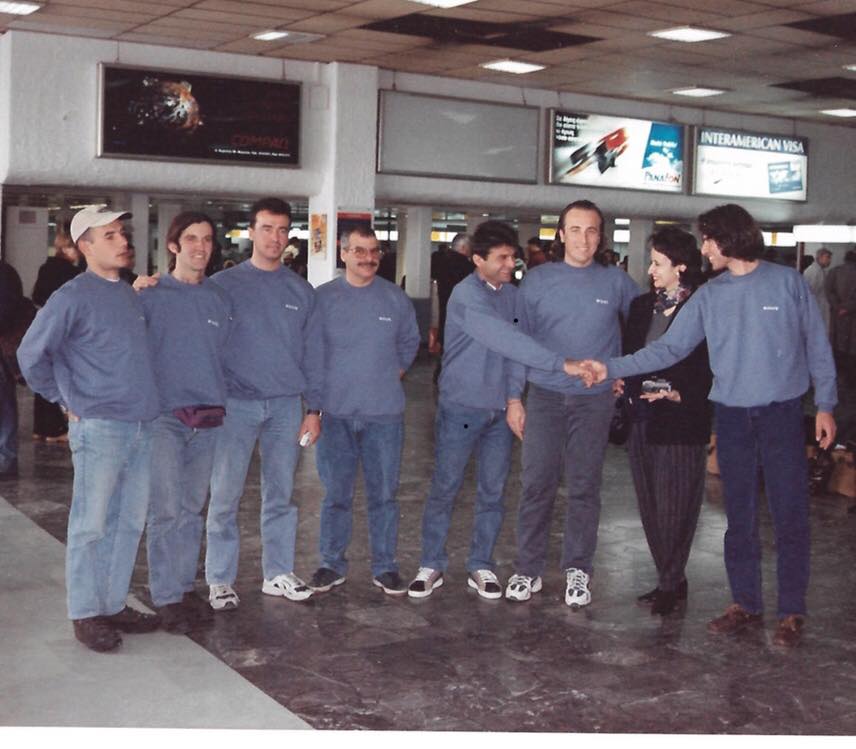
Are there any sponsors?
“Of course there are, as long as you go looking for them. If you wait at your home and you say that mountaineering is an expensive sport, that it is for the rich – what I hear -no one will come and ask to sponsor you. To find a sponsor, you must be “something”, you have to say “something” from an action that you have created, ie – no sponsor will give money to someone who they don’t believe in, someone who has no activity. So there are sponsors, as long as one wants to discover them – I have a background that can use the money of sponsors. I have been granted by Sony, Fujitsu, by BMV recently, by Coco-Mat, by very large companies. ”
What do you advise someone who wants to get involved in climbing? How do they start?
“I’d tell them to go to the mountains, to enjoy the splendor of nature and sport, be in a place unspoiled, virgin, clean, to exercise their mind and body and savor the pleasure of movement – for this is what mountaineering offers – in such a nice place. You enjoy the joy of movement, you enjoy the joy of being in a place you really appreciate. It needs carefulness, caution and, of course, every time, the action that one follows and implements to be on the scale of their capabilities.
It is good, first of all, to go through a climbing school or to have lessons with someone – something you need in any case, because even after the lessons you need to go with an experienced climber, a more experienced one than you, so that you raise your level, but also the level of your action at the same time. The action is a relative thing, one may enjoy from a leisurely walk to the climb of a hillside in the Alps to make a 7th or 8th peak in the Himalayas – that’s about that. There is no easy or difficult action. It is important to go to the mountain and enjoy the mountain – the simplest thing. Everyone likes different things, so let them try – always while being safe. ”

Next missions?
“Next is Makalou in the spring of 19′ – because it can happen only in autumn and spring – and the summer of 19′ is the K2. Although I am a man who doesn’t like to say what he will do before it is done, I’m still in good spirits because of my previous mission, and so I announced Makalou so early on. And as far as the 82-point goal is concerned, we are at 44 right now, after some years of trying and slowly moving on. ”
What do you answer to those who say climbing is an expensive hobby and that’s why they don’t get involved with it?
“Indeed, some say it is the money that stops them. It’s not the money – that’s completely wrong. If you go to the mountain by yourself, in the sense that you have a “rope-companion” and you don’t need to get a Sherpa (a Nepalese people from Nepal and the State of Sikkim of India, who have gained worldwide reputation as drivers and porters in the Himalayas), thing I did – I went without help, all climbing was on me alone, I was carrying all my things – the cost is too small and all you need is strong will and love for what you do.
Because if you do not have these, you will surely test yourself, asking you to go back to the safety of your normal life, family life and urban life in which you feel safe – because there, you definitely don’t feel safe. But you feel something else; you feel amazing, you feel great and do something you like. That’s my point, money is not the deterrent – others have money too, but they don’t go mountaineering because they don’t enjoy it. ”
Do you think that the increase in the number of climbers in recent years has been positive or negative for the alpine sport?
“Everyone has the right to this life, everyone has the right to the sport, to pleasure, to nature and all that. I think everyone should have these rights, as long as they are done with readiness, correctness and without affecting nature. When climbing is done in a way that does not offend nature, but in a way that offers pleasure, joy and fun to the people who are active there, then it is legitimate and everyone is entitled to it. As long as they don’t destroy or pollute nature – so there will not be much debris that brings various environmental impacts later. The issue of environmental protection is a major issue “.
Antonis Sykaris died on April 22th, 2022. The Greek mountaineer renowned for conquering some of the world’s toughest peaks died during a mission on the Himalayas in Nepal, his team announced in a post on Facebook on Tuesday.
The incident reputedly occurred at an altitude of 7,400 meters at 4 a.m. Nepalese time, his team said in the post.



